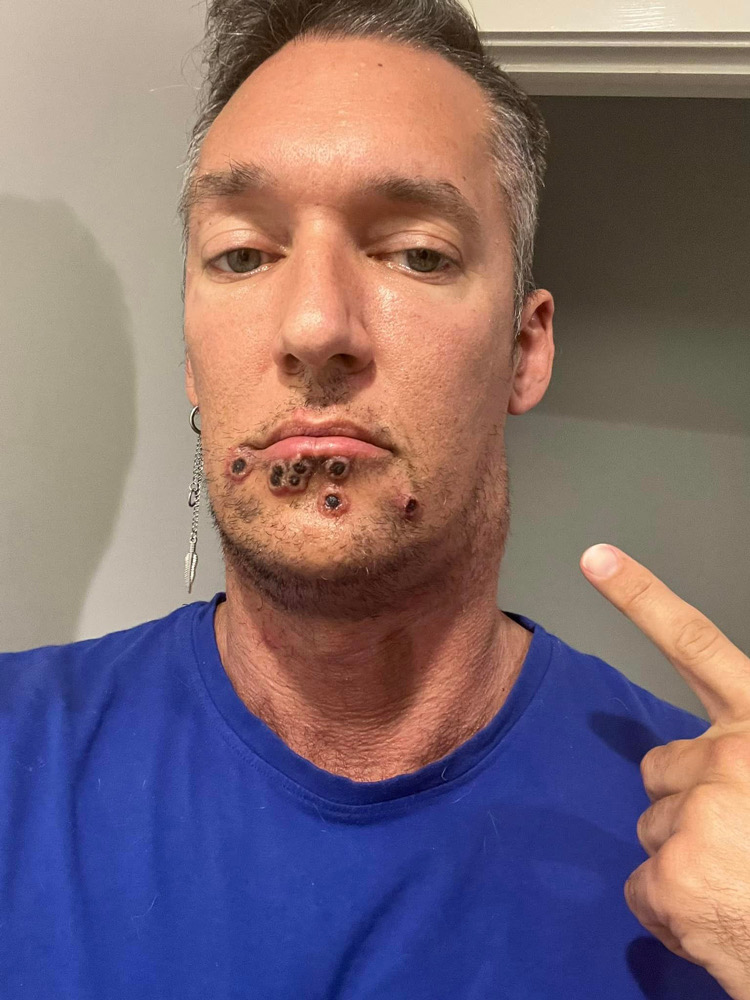
Gay Houston Man Battling Monkeypox Raises Awareness
Wesley Wallace urges folks to stay alert and to try getting vaccinated.

Wesley Wallace, a 42-year-old gay Houstonian, knew what monkeypox was. He’d followed the news of an outbreak of the mostly African viral disease that causes skin lesions and flu-like symptoms as it spread from Europe to New York—and ultimately to Texas and Houston in June.
“I knew what it was, I knew I was at risk,” he says. “I tried to get the vaccine, but I couldn’t. I thought I was being careful. Clearly, I wasn’t being vigilant enough.”
Over the July Fourth weekend he went to several bars and, while he was shirtless, hugged and kissed a few men. The following weekend, he started seeing little white bumps under his chin.
“By the next Friday I had flu-like symptoms, and then I got the test back and it was positive,” Wallace recalls.
Monkeypox has seen an alarming rise in America, particularly among men who have sex with men. However, simply being in close contact with someone who has symptoms—or their clothing or bedding—is all it takes to pass the infection. According to Harris County Public Health, as of July 28 there were 71 confirmed cases in the county—a 60 percent increase over the previous week—and 287 cases throughout Texas.
The World Health Organization (WHO) on July 27 recommended that gay and bisexual men limit their number of sexual partners to protect themselves from monkeypox and help slow transmission of the rapidly spreading virus. The WHO’s monkeypox expert, Rosamund Lewis, says men who have sex with men are the group at the highest risk for infection right now. About 99 percent of cases are among men, and at least 95 percent of those patients are men who have sex with men.
WHO chief Tedros Adhanom Ghebreyesus adds, “For men who have sex with men, this includes, for the moment, reducing your number of sexual partners, reconsidering sex with new partners, and exchanging contact details with any new partners to enable follow-up if needed.”
Still, officials emphasize that monkeypox is not a “gay” disease.
“Monkeypox can and does infect everyone, regardless of sex or age,” says Kirstin Short, the Houston Health Department’s chief of epidemiology, who saw the first case in early June. “In the current outbreak, we are seeing a preponderance of cases in men—some who have traveled overseas recently, but also some who haven’t.”
For Wallace, the pain was horrible. With lesions inside his mouth and throat, he couldn’t eat or swallow without using a medicated gargle and spray. He also took prescription pain medications and antibiotics, and he developed strep throat as well.

The antiviral Tecovirimat (TPOXX), used to treat smallpox, was confirmed by the World Health Organization in May to be effective against severe cases of monkeypox. But it is only available through the Centers for Disease Control and Prevention (CDC), and Wallace couldn’t get it here.
Likewise, vaccines against monkeypox are only available currently through the CDC. There are two vaccines licensed by the U.S. Food and Drug Administration (FDA) available for preventing monkeypox infection—JYNNEOS (also known as Imvamune or Imvanex) and ACAM2000. In the United States, there is currently a limited supply of JYNNEOS, although more is expected in the coming weeks and months. There is an ample supply of ACAM2000. However, this vaccine should not be used in people who have health conditions that include a weakened immune system, skin conditions like atopic dermatitis/eczema, or pregnancy.
Harris County and the City of Houston have received about 5,324 doses of monkeypox vaccine from the CDC as of July 26, but is reserving those doses for those who are immunocompromised or have been exposed to the virus. (If given directly after exposure, it can be effective in reducing symptoms.) Harris County and the City of Houston on July 28 requested at least 5,000 more vaccine doses. Just the day before, the FDA announced that 786,000 doses of Bavarian Nordic’s monkeypox vaccine were being made available in the US.
“I know people who went to Canada to get the vaccine,” Wallace says, adding that he began sharing his story on social media to raise awareness about the virus. “I went public with my case because I wanted others to see that this isn’t a death sentence. The pain can be horrible, and the isolation is almost worse, but they need to know that there is hope.”
Wallace is going on a month of prescribed quarantine, but he thinks his lesions will be healed in a week and he will at least be able to leave his house again.
“My advice is, don’t freak out,” he says. “But please give this disease the attention and vigilance it needs. You can go out; just maybe don’t kiss and hug others. And don’t give up trying to get vaccinated.”
On July 29 Houston/Harris County received the first of three emergency shipments of 16,870 doses of JYNNEOS. Check houstonhealth.org or call the department’s call center at 832-393-4220 or 832-927-0707 for information on vaccine appointments.











Comments